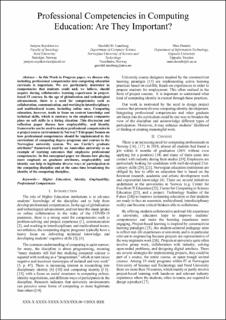Professional Competencies in Computing Education: Are They Important?
Peer reviewed, Journal article
Accepted version
Permanent lenke
https://hdl.handle.net/11250/2723431Utgivelsesdato
2020Metadata
Vis full innførselSamlinger
Originalversjon
10.1109/FIE44824.2020.9273987Sammendrag
In this Work in Progress paper, we discuss why including professional competencies into computing education curriculum is important. We are particularly interested in competencies that students could and, we believe, should acquire during collaborative learning experiences in project-based IT courses. In the times of globalization and technological advancement, there is a need for competencies like collaborating, communicating, working in interdisciplinary and multicultural teams, while computing education tends to focus on content knowledge and technical skills. Which is contrary to the emphasis companies put on soft skills in a hiring situation. This discussion and reflection paper discuss how employability, and identity frameworks can be used to analyse professional competencies in a project course environment in Norway? This paper focuses on how professional competencies should be implemented in the curriculum of computing degree programs and courses in the Norwegian university system. We use Curtin’s graduate attributes" framework used by an Australian university as an example of learning outcomes that emphasize professional competencies. In this conceptual paper we discuss how putting more emphasis on graduate attributes, employability and identity can help to legitimize diverse ways of participation in the computing discipline and at the same time broaden the identity of the computing discipline.
